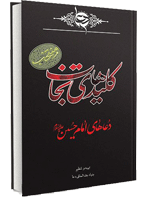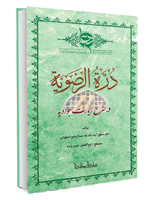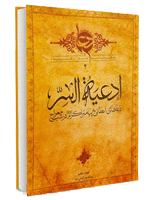- Prophet Muhammad (P.B.U.H&HF): Whenever one of you is needy and brings that to other people, he will not be satisfied. and Whenever someone is needy and brings that to Lord, he shall give him what he wants. sooner or later.
- Imam Sadiq (As.): Whenever you had tenderness in your heart, Pray. because your heart doesn't get tender unless it's pure.
- I told to Imam Baqir (A.S): “What is the meaning of “truly, Ibrahim was awwah and patient”? He replied: “Awwah means (the one who is) praying (to) and wailing (for God) a lot.””
- “Two people, who have acted alike, enter the heaven, but one of them sees the other one in a higher place. Then, he says: O’ Lord! How come has he a superior place in comparison to me while we acted alike? God the Almighty replies: “because he asked Me (whatever he needed) and you did not do that”.
- “The most knowledgeable person to God is the one who asks more from Him”
- “Whoever prays a lot, the angels say: This voice is familiar (to us) and this is the supplication which is accepted and this is the need which is provided”
-
The Holy Prophet (peace be upon him and his Household):
-
وَ لَوْ عَرَفْتُمُ اللَّهَ حَقَّ مَعْرِفَتِهِ لَزَالَتِ الْجِبَالُ بِدُعَائِكُم
If you knew god the way you should’ve known, Mountains definitely will be moved by your supplications. - Crying out of fear of God is the key to his mercy, it’s a sign for his acceptance and it’s a door to answering [supplications]
- Pray to God and believe in his answeres. But understand that God won't accept prays from an unwitting oblivious heart.
Vincent Brummer’s perspective on the conflict between supplication and absolute divine knowledge and its critique from the perspective of Mohammad Hossein Tabatabaei.
بسم الله الرّحمن الرّحیم
Vincent Brummer’s perspective on the conflict between supplication and absolute divine knowledge and its critique from the perspective of Mohammad Hossein Tabatabaei.
Authors: Abdul Rasul Kashfi, and Maryam Al-Sadat Nabavi
Translator and editor: AbdolQhadir Mojahid Ghaznavi
Summary
From the perspective of a group of religious philosophers, supplication is in conflict with two divine attributes: "absolute knowledge" of God and His being the "absolute goodness". In other words, the effectiveness of supplication seems incompatible with the fact that God is both absolutely good and absolutely knowledgeable. This apparent inconsistency has its roots in two issues. Firstly, the absolute knowledge of God implies knowledge of all matters including future events, which necessitates a certain determinism and foreknowledge of events in the world. Therefore, the occurrence or non-occurrence of an event is predetermined, making supplication seemingly ineffective in bringing about or preventing it. Secondly, Human desire makes the state of the world better or worse than it is, and due to His absolute goodness, it is necessary for God to fulfill the wish in the first scenario even without supplication, and in the second scenario, even without supplication, He may not answer, yet in both cases, supplication seems to be ineffective. This article seeks to examine and review a contemporary religious philosopher, Vincent Brümmer's perspective on resolving the first issue of the conflict between supplication and divine foreknowledge, relying on the views of Allamah Mohammad Hossein Tabatabaei.
Keywords: Supplication, Absolute Knowledge, Free Will, Theory of Reconciliation, Theory of Determinism, Theory of Openness (The Open Theory).
Introduction
The concept of supplication
The concept of supplication is an inner and formal religious act that consciously seeks a connection with a supernatural power. The essence of supplication is attention of an incomplete being to the absolute perfection to remedy one's own deficiencies and needs. Logically, through supplication, a human enters into a tripartite relationship involving God, human, and the object of the request. This connection is established only if these three elements exist. Many researchers argue that the central and fundamental aspect of this relationship is the loving relationship between the created and the Creator, and they attach great importance to interpreting this aspect of supplication.
Problem Statement
Since God is the Absolute-Knowing, is it necessary for humans to inform God of His needs? Can divine action be effect on human supplication and request? How can a God who is the Absolute-Knowing and knows all past and future needs and desires of humans rely on the requests of His creation for His governance? If everything in this world conforms to His eternal knowledge, how can supplication impact this world? In what way does this impact occur? Can human desire change the actual realization of matters that are predetermined in God's knowledge? If not, is supplication pointless? If God has prior and eternal knowledge of all matters, does He not know the probabilities and future events? Isn't God's omniscience a sign of the truth of any matter? Doesn't this truth testify that these statements will definitely conform to God's knowledge? Therefore, apparently there is no need for supplication and request; where does the requested supplication fit into God's organized plan? If God knows, for example, that it will rain next Tuesday, and in the meantime, an individual prays for rain on that same Tuesday, what is the impact of his supplication? Can it be said that if God knows it will rain, then it will rain, and this matter will not be dependent on the person's supplication? In other words:
1. If God knows possible events, then He knows all future possibilities.
2. God's knowledge confirms the truth of any statement.
3. Only one state of various situations will be actualized.
Therefore, apparently there is no need for supplication, and requesting from God is ineffective. If God has already designed all His plans and is going to act accordingly, why should we pray? Our main claims and assumptions in these three following statements are summarized:
1- God is the Absolute-Knowing or Omniscient.
2- Some supplications are effective and answered.
3- God performs actions and realizes matters that wouldn't be done if not prayed for.
How should the answer and acceptance to supplication be explained to be consistent with the main claims in this regard? The question about the response raised here does not address two other forms of supplications, namely “repentance and seeking forgiveness from God", and "praising and thanking God." Supplication in the sense of requesting something desirable or warding off something undesirable from God is seemingly in conflict with God's foreknowledge. The absolute knowledge of God means knowledge of all matters including future events, which from some perspectives implies a kind of determinism and predestination in the events of the world. The occurrence or non-occurrence of an event is predetermined; therefore, praying for its realization or non-realization seems apparently futile.
Regarding the subject, philosophers have posed different viewpoints, such as the theory of Reconciliation, the theory of Fatalism and the Open theory, the theory of Molinism, which we only focus on the Vincent Brummer’s theory here in the translation.
Vincent Brummer’s Perspective
Vincent Brummer presents the apparent contradiction between supplicatory prayers and absolute divine knowledge under two main headings. In the initial discussion, he refers to divine foreknowledge and outlines the conflict as follows: If God has foreknowledge of the future, then supplication is futile. No event can occur outside its true course, and no human agent can alter this process because all these instances necessitate the nullification of God's pre-eternal knowledge, which is logically impossible. If a believer's whole life is in communion with God, what is the need for supplication? He delves into this issue in his book “What are we doing when we pray?”, exploring the compatibility of absolute divine knowledge and human supplication by addressing related issues: In fact, by stating that God has foreknowledge of the future, he enters into the realm of pre-eternal divine knowledge that what happens to prayer if God knows the future? Does the irrefutability of divine knowledge lead to the determinism of world events? Supplicatory prayers, in a deterministic and decisive world where God has foreknowledge of every event and all human needs, become meaningless.
Since every being in its existence relies on God, it is never possible for a veil or barrier to exist between that being and God; rather, everything is manifest and clear to Him, and He is aware of everything inside and out. Through His intrinsic attribution, God has control over every being and the reality of everything is present for Him. Brummer defines knowledge as the presence of the perceiver. He explains absolute divine knowledge as follows: if p is correct, then the Most-High God has knowledge of it, and if He believes in p, then it must be correct. He elucidates that no event can occur outside its true course, and no human agent can bring about a change in this process, attributing this to the invalidation of God's foreknowledge. However, if we consider God's eternal essence, we do not face these issues. For a meaningful explanation of supplicatory prayers, there must be a temporal sequence among the objects in the world, and the divine presence in this context must be eternal, meaning without beginning or end.
Boethius (A Christian writer and philosopher 480-524 AD) argues that since God's existence transcends time, His foreknowledge proves His pre-eternal nature. He explains God's pre-eternal knowledge of future events through a metaphor: God exists beyond time, observing all moments of past, present, and future simultaneously. He is like a watcher standing on a mountain peak, seeing the entire valley below at once. He is aware of every moment in time, and every event is present to Him like the present moment; thus, past and future are not relevant to His knowledge. God's omniscience encompasses infinite present moments and past. He sees all events while their possibilities still remain without being limited and restricted.
Final remarks by Brummer
According to Brummer, if we consider the eternal existence of God in the sense of His being without beginning and end, we can understand supplication to be compatible with pre-eternal divine knowledge because pre-eternal knowledge takes on a different meaning. Pre-eternal divine knowledge does not describe God as being outside of time; rather, He Himself is present on the scene, managing objects and phenomena. Such an explanation does not lead to fatalism. He seeks to explain how God's knowledge of the future is described; God's knowledge encompasses everything as they are. Therefore, he rejects this definition of pre-eternal knowledge in which everything is predetermined in God's knowledge and comes true accordingly. God doesn't just know the probabilities linked to each existence but also doesn't force changes in human minds. Supplication is a cause, and God is aware of human actions and their consequences. Hence, this divine knowledge allows for a universal design with free elements where supplication holds significance.
Brummer, in the second part of his analysis, refers to God's awareness of our desires and current needs. God, according to His absolute knowledge, knows what we need, and there is no need for us to become aware. He does not render supplicatory and submissive prayers meaningless and unnecessary; on the contrary, he provides the necessary condition for God to give us what we need or want. In other words, Brummer describes supplication or prayer as an incomplete cause, as the content of supplicatory prayer involves pleading and beseeching, it implies expressing dependence on free will that the Lord can take. These two characteristics necessitate a personal relationship that is established in supplication in the world that God has created. It is an uncertain and non-compulsory world in which both God and humans have agency. Although this seems contradictory to the theory of God's staidness and absolute divine knowledge, past explanations based on the role of pleading and insistence in supplication and the possibility of a personal relationship between humans and God maintain this apparent contradiction by preserving all these characteristics. By elucidating the personal nature of the relationship in supplication, Brummer proves both human agency in supplication and the agency of God, which, of course, has also caused this agency.
Critique and Review of Brummer's Perspective
The main problem with Brummer is that he considers the irrefutable knowledge of God about the future to necessitate determinism and predestination, which is incompatible with the response and function of prayer. He is trying to solve the issue of determinism and the non-volitional nature of human action by explaining a specific aspect of divine foreknowledge. Bromer deems the knowledge of something that does not yet exist (the future) impossible, while God has knowledge of the probabilities associated with each action and event. However, which probability will actualize is unknown to the Him because His knowledge of the action itself leads to the non-existence of a world with free and voluntary agents. From his perspective, divine foreknowledge is accurate to the extent that it knows that compulsory action comes from a compelled agent and voluntary action comes from a voluntary agent, not the knowledge of which one will occur.
A crucial point in examining Brummer's statement is to consider what the divine knowledge entails. Are human voluntary actions absolutely part of it, or His eternal knowledge of human voluntary actions is associated with will and volition? It seems that Brummer’s main conflict with the Shiite theologians lies in this matter. If we say that God's eternal knowledge belongs to actions and affairs in an absolute way, Brummer's statement proves to be true. But when considering the idea that God's timeless knowledge is intertwined with human voluntary actions under the condition of free will, where one's choices play a role in bringing actions to life, a fascinating perspective emerges. This viewpoint suggests that God, from eternity, knows how individuals will willingly execute their actions or opt out, based on their own decisions. This unique insight sheds light on the concept that God's knowledge doesn't determine the actualization of actions but rather focuses on the probabilities inherent in individuals. Renowned scholar Brummer elaborates on this, emphasizing that God's prior knowledge is intricately linked to the qualities present within individuals, leading to the determinism and challenging the notion of foreknowledge.
Allamah Mohammad Hossein Tabatabaei believes that for God, there is a knowledge of His essence, meaning that He has knowledge of other things in the degree and level of their essence. This knowledge is known as pre-eternal knowledge, and it is a general knowledge while also containing detailed knowledge. After He Created the creation, His knowledge extends to the beings in the degree of their existence. Tabatabaei further asserts that regardless of our limited perspective, entities yet to materialize are already within God's awareness, awaiting their time. He grants us will and choice, foreseeing our decisions, as His omniscience leaves no room for unforeseen alterations. In God's eyes, all beings exist, and the truth of any knowledge finds clarity before the All-Knowing, who comprehends His essence in its entirety. Divine pre-knowledge does not lead to determinism or fatalism in the world, and humans act with free will without divine eternal knowledge being an obstacle. The eternal knowledge of God does not have any influence on the necessity of an action in humans, and God's knowledge is not passive and dependent, but rather His knowledge is active and influential in the effect of the effect. Its relation to things must be in accordance with the principle of causality and contingency, so that every effect thing truly emanates from its proximate cause, not in such a way that the divine pre-knowledge be related to the actualization of an action without a cause or reason, which necessitates determinism. If God's knowledge occurs in accordance with the will and volition of the agent, then this confirms the existence of free will. God's knowledge and awareness are part of the chain of causes, while human power and free will are situated in the chain of means and causes. Just as Tabatabaei also indicates, God's eternal knowledge is related to everything according to its characteristics as it is, therefore, the relation of this knowledge to voluntary actions is due to the voluntary nature of those actions. Hence, it is impossible for these actions to occur involuntarily.
For further elaboration, refer to the books "Nihayat al-Hikmah," Vol. 3, Al-Mizan, Vols. 1, 10, 11, 17.
Human actions do not conflict with the necessity derived from free will alongside the non-coercive nature of the world, considering the presented statements, but rather, they underscore it. What a person chooses to do with their freedom and volition is known to God, not absolutely without description of will as Brummer suggests, but rather based on the specific causes and circumstances, which human will and choice are also of contributing factors. A fitting response to Brummer's assertions would be that he has misinterpreted God's object of knowledge and His foreknowledge. God's omniscience doesn't just pertain to the fundamental occurrence of actions and events, but also to their characteristics and principles. While Brummer's interpretation of previous knowledge has been constrained and limited, Mohammad Hossein Tabatabaei's explanation is far apart from such a problem.
God's eternal knowledge is intertwined with the system of causes and effects in the universe, and divine knowledge is linked to events concurrent with God's awareness of the causes and reasons behind those events. These causes and reasons vary; some are tied to natural causation and its agents, while others are related to intentional causation and its agents, some being compelled and others voluntary and what the essence of divine foreknowledge requires is that the effect of a compelled agent must arise compulsorily from the compelled agent, and the effect of a voluntary agent must emerge voluntarily from the voluntary agent. For instance, if God's knowledge foresees a specific large ice block melting into water in a particular year in the polar region, it's not that this knowledge is irrelevant to the event, but rather that it stems from an understanding of the underlying causes, such as temperature changes and specific occurrences, leading to the transformation of the ice into water.
The knowledge of God about events and actions is concurrent with His knowledge of their causes and agents, and the occurrence of effects is dependent on the occurrence of their causes. Human, as a free agent/subject, one of the components of the cause of his actions, is his free-will and choice. Therefore, what divine knowledge pertains to is the issuance of a specific action from a human along with its cause. One of the components of the cause of the issuance of an action from a human is his will. The eternal divine knowledge is not separate from the system of causes and effects in the world. Divine knowledge is the knowledge of the system of causes and their effects. In other words, God has knowledge and awareness of the issuance of effects, events, and human actions from their specific causes.
Since Brummer rejects the previous divine knowledge based on not believing in the necessary knowledge of God, in fact, his argument revolves around the idea that the eternal knowledge does not require the effect to exist eternally with its unique essence. Tabatabaei's explanation could serve as a response to Brummer, suggesting that the Almighty possesses two forms of knowledge regarding His creation: one, knowledge in presence (Elme-Hozori) before creation and the other after, within the realm of the effect. This belief in divine foreknowledge which is irreversible, does neither demand the presence of specific events or objects in eternity, nor does it lead to predestination and render supplications and prayers ineffective in the system of creation.
Conclusion
The absolute knowledge of God means knowledge of all things, including future events, and therefore, from the perspective of some philosophers, this knowledge entails a kind of determinism and predestination in the events of the world. The occurrence or non-occurrence of an event is predetermined, so praying for its realization or non-realization is seemingly ineffective. Brummer believes that the effectiveness of supplication requires the existence of a divine being that has a temporal relationship with humans and the world. He considers belonging the divine to human voluntary actions as implying a form of determinism, and thus, he addresses the effectiveness of supplication by denying the divine foreknowledge or pre-eternal knowledge.
From the perspective of Tabatabai, the previous divine knowledge does not negate the impact of supplication. The eternal knowledge of God is not separate from the causal system of the world, and the association of divine knowledge with the events is akin to God's knowledge of the causes and reasons for those events. What the previous divine knowledge necessitates is that the effect of the necessitated agent on the compulsory agent be issued in a compulsory manner, and the effect of the voluntary agent on the voluntary agent be issued in a voluntary manner. God's knowledge of events and actions is parallel to His knowledge of the causes of those events, and the occurrence of effects is dependent on the occurrence of their causes. One of the components of voluntary and free actions is choice, so what the divine knowledge relates to is the issuance of a specific action from the human along with its cause, and one of the components of the cause of issuing an action from the human is his will. The primary divine knowledge is not separate from the causal system of the world. Divine knowledge is knowledge of the system of causality and effectuality, meaning that God's knowledge of the issuance of effects and human events and actions from their specific causes is called knowledge and awareness.
List of References
1. Martin Boober, 1388, "Me and You," co-authored by Ilham Atarodi and Abutorab Sohrab, Farzan, Tehran.Vincent Brummer, 1383,
2. "Religion in the Modern World," a compilation of lectures by Vincent Brummer at the International Center for Civilizational Dialogues, authored by Amir Akrami and others, published by Pezhvak, Tehran.
3. Al-Shirazi, Sadr al-Din Muhammad, 1410, " The Transcendental Philosophy," Volume 6, published by Darul-Ihya al-Turath al-Arabi, Beirut.
4. Tabatabaei, Mohammad Hossein, 1388, translated "Tafsir al-Mizan," Volume 11, by Mohammad Baqer Imam Hamedani, published by the Office of Islamic Publications, Qom.
5. Shirvani, Ali, 1384, "Nihayatul-Hikmah," Volume 3, published by Bustan Ketab, Qom.}
6. Aquinas, Thomas, 1922. Summa Theologica, 2a2ae. 83. 2, trans. "the Fathers of the English Dominican Province", London: Burns. Oates, &
7. Washbourne. 8. Boyd. A. Gregory, 2007, Hunt, David, Lane Craig, William, Helm, Paul, Divine foreknowledge four views, (ed.) Beilby, James & Pual R. Eddy,
8. Intervarsity press. Downers grove, Illinois.
9. Brummer. Vincent, 1984, What are we doing when we pray?, London, First published.
10. 1993, The Model of Love, Cambridge, first published.
11. 11.1992, Speaking of a Personal God, Cambridge, first
published.
12. Dale, Luther Paul, 1974, Providence and Prayer, School of Theology at Clarmont
13. Flint, Thomas Patrick, 1998, Divine Providence: The Molinist Account. (ed.) William P. Alston, Ithaca, NY: Cornell University Press.
14. Gregory, A. Boyd, 2000, The Open View of The Future, Baker Books.
15. Heiler, Friedrich, 1958, Prayer, (tr.) Samuel Mecomb, New York, Oxford University Press.
16. Lane Craig, William, 1991, Divine Foreknowledge and Human Freedom, library of Congress Cataloging, USA.
17. Moor, Scott W, 2006, The Problem Of Prayer, Southwestern Babtist Theology Seminary.






